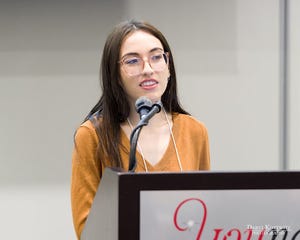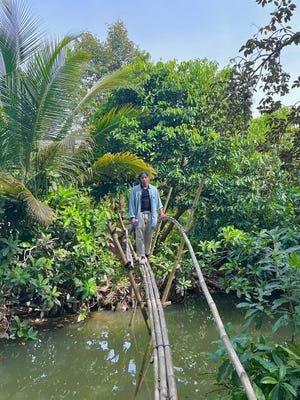As conversations around climate change heat up, colleges and universities are beginning to lead the way in looking for solutions. The National Recycling Coalition (NRC), joining 23 industry organizations and 6,000 members, is tapping into this population’s energy, which began decades ago when it started inviting schools to tag along at its conferences, then created a college and university recycling coalition, which later became CURC, representing recycling and sustainability professionals in higher education who help academia excel in recycling and waste reduction.

As conversations around climate change heat up, colleges and universities are beginning to lead the way in looking for solutions.
Campuses are churning out research around climate and the environment. They offer internships and degree programs in environmental architecture and design, environmental engineering, environmental law, marine sciences, and energy, among areas. Graduates of these programs are moving into green-collar jobs in niches like alternative transportation, wind and solar, and the built industry.
Outside of the classroom and labs, students engage in robust climate tracking and reporting practices. They run competitions and set up pacts challenging themselves to see how deeply they can divert, aiming high and often reaching around 90 percent diversion.
The National Recycling Coalition (NRC), joining 23 industry organizations and 6,000 members, is tapping into this population’s energy, which began decades ago when it started inviting schools to tag along at its conferences, then created a college and university recycling coalition, which later became CURC, representing recycling and sustainability professionals in higher education who help academia excel in recycling and waste reduction.
Building on these efforts, NRC began giving out money for college tuition to students interested in sustainable materials management, though its target has widened—candidates simply need to show a hunger to protect the environment in some way.
More than 100 students vie each year for the two or three scholarships that are ultimately awarded. Over the years, 79 of them have received a total of $140,000 from the program, named for NRC cofounder Murray J. Fox.

“He was going to these conferences and was impacted by the college students hanging out there. Little did we know he had such a fondness for youth in his heart,” he says.
Some have gone on to advise non-governmental organizations; to run recycling organizations; or work at county solid waste operations. Others are staffers overseeing campuses’ zero waste commitments—the same programs they volunteered for at one time.
These days priority goes to applicants with academic or professional interests in social justice aspects of sustainable materials management, such as local community health and custodial safety in underserved and/ or low-income communities.
At 24 years old, Murray Fox Scholarship recipient Haley Nolde is director of the Nebraska Recycling Council where she interned in college.
In her year at the helm she has testified on legislative bills, pieced together information for state senators to help inform their policy decisions, and worked to orchestrate a fall conference. But she talks most about one pet project: working with her staff to make recycling accessible to blind Nebraskans, an initiative she hopes will expand to benefit more people with different disabilities.
“I feel there are so many sectors missing from the table when making decisions about recycling accessibility. How does curbside work for people with varied disabilities? NRC will not speak for them because we do not have firsthand experience. We would rather ask them, ‘what have you experienced and how can we help you?’”
Going back to her college days, and specifically the afternoon she filled out the scholarship application, Nolde says, “I always felt climate change accelerates injustice issues around the globe, so it was easy for me to answer the questions. I was speaking from my heart about something I believe in.”
She reflects on her work volunteering for a mission where she sorted mountains of clothes, and links consumption habits with social justice and climate.
“Overconsumption is a problem around the world. And people who contribute to climate change the least experience its impact the most as far as how overconsumption comes to play,” she says.
She challenges other students and young professionals to get involved in steering waste management toward its future as a tool against climate change.
“I love my position. I’m not going to say it doesn’t feel heavy or scary at times [especially as someone fairly new to the industry].
“But no one knows everything, and rather than be intimated by those who know more than you, learn from them. Don’t be scared.”
She admits it’s easy to say today, with a year of leadership experience under her belt.
“Now I see pushing yourself pays off. If I hadn’t pushed myself to be uncomfortable, I would not be in the position I am in now.”
DeBell, who has long worked in higher education, sees students driven to make their way into a $236 billion recycling and sustainable materials management industry. They see well-paying jobs with benefits to pay off their college debt.

\Murray Scholarship fund recipient Ricardo Sheler is an engineering student at New York University, about to start his senior-year research project on flood and community resilience in the South Bronx. He’ll be busy, as he also interns at the New York City Department of Housing Preservation and Development.
He sees the path in sustainability work as wide open and branching, rather than laying out one straight route.
“The sustainability space refuses to be pigeon-holed to one type of advocacy. Rather the modern movement feels like it goes beyond older waves of environmentalism and social justice that more frequently pressured people and systems to think and act in more linear and independent ways.”
Today’s trend he says is toward a more collaborative approach to comprehensively address systemic problems.
Sheler’s ambition is to serve in some sort of public office capacity on policy.
“Public policy and planning are really powerful tools to codify the society we want to live in. Policy, regulations, and laws could be one of the most effective and straightforward ways to expand social programs and environmental accountability.
“But I also look forward to working in community engagement to help change the way individuals perceive and operate for the benefit of more connected, vocal, and sustainable communities,” he says.
NRC prioritizes students living in disadvantaged areas who are using their degrees to benefit their communities, as well as those studying different disciplines, whether aerospace, supply chain management, nursing, and even dance –as long as they want to better the environment.
“We want to have a far-reaching talent pool of future leaders, and to bring the richness and asset of academics to bear on the climate crisis,” DeBell says.
About the Author(s)
You May Also Like




